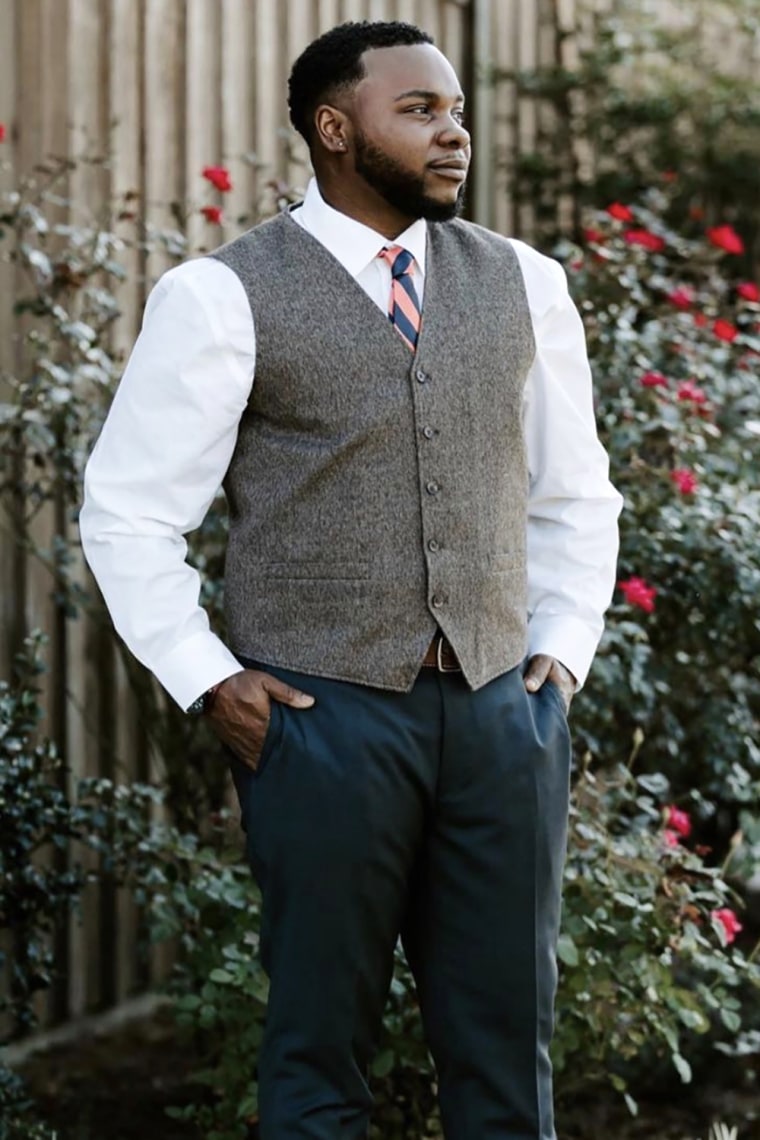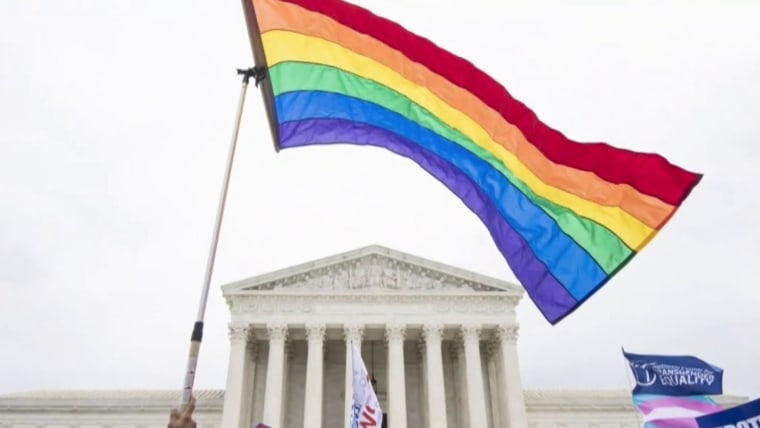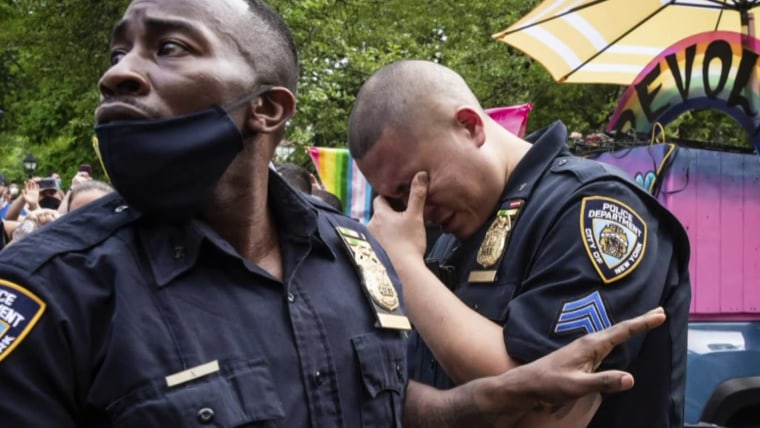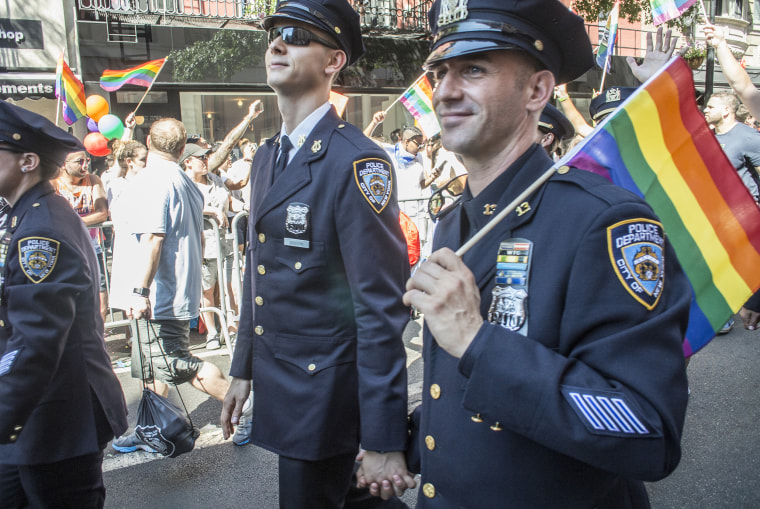Transgender recruit sues New Orleans Police Department for alleged hiring discrimination
Britton Hamilton said, as a trans man, he wanted to become a police officer to help promote change from the inside.
He applied to the New Orleans Police Department in June 2020, and after several exams and a panel interview, he received a conditional job offer in December.
“It was like a dream job,” Hamilton said. “I want to be able to help the community and help people to view police officers differently than how they are feeling now.”
The offer was conditional on him passing a routine medical and psychological evaluation, during which he said the psychologist asked him questions about his transition.
On Jan. 26, he received an email from the police department rescinding the conditional offer “based on a psychological assessment” of his “emotional and behavioral” characteristics.
“It was super, super disappointing, because I prepared myself physically, emotionally for this job,” Hamilton said. “This is the foundation for me and my family.”

In May, Hamilton filed a federal complaint with the Equal Employment Opportunity Commission alleging hiring discrimination. His attorney, Chelsea Cusimano, said the EEOC has since opened an investigation.
The New Orleans Police Department issued a statement in May.
“The decision not to move forward with the applicant in question did not involve any discrimination against the individual as a member of a protected group,” the statement read in full.
The department declined additional comment.
Hamilton’s experience isn’t unique, said Julie Callahan, a former law enforcement officer in San Jose, California, and the founder of the Transgender Community of Police and Sheriffs, a peer support group for trans law enforcement officers. Trans people face disproportionate employment discrimination generally, and she said law enforcement, which she described as a relatively conservative field, is no exception.
TCOPS is trying to do its part by providing training and policy templates to departments in the hopes that this educational material can help address the biases and misinformation that lead to discrimination. But outside of that, it’s incredibly difficult for trans people to prove they’ve faced hiring discrimination. Even if they can, many can’t afford to take legal action.
Complicating matters is the historically fraught relationship between law enforcement and the LGBTQ community. This has caused some transgender officers — many of whom are trying to address inequities from within — to face pressure from both sides.
“It’s an ongoing issue that we have to address as a society,” Callahan said of the hiring discrimination trans law enforcement officers face. “We’re starting to see agencies that are developing transgender interaction policies with the public, but they’re not developing policies like this for their employees, and we find that ridiculous. You should be doing both, because you’re going to have people from the community working or at least trying to get jobs at your agency.”
‘That’s not equal protection of the law’
Hamilton alleged that the psychologist who did his evaluation asked him questions like, “What were the names of your doctors that performed your surgery? How does your family feel about you being transgender? How does your wife feel about you being transgender?”
“I felt like it was kind of weird because … it doesn’t pertain to the duties of being a police officer at all,” Hamilton said. The psychologist, who is named in Hamilton’s complaint, has not returned a request for comment.

Supreme Court rules existing federal law forbids discrimination based on sexual orientation
As part of standard procedure, the department asked Hamilton for information about his employment over the last 10 years.
After the psychological evaluation, Hamilton said the department asked for documentation outside of the standard 10-year window related to his honorable discharge from the Army 12 years ago due to medical issues, according to his EEOC complaint. Hamilton provided part of the medical discharge records signed by himself, his commanding officer and a physician stating why he was discharged. The department asked for his complete Army medical record, which Hamilton requested from the National Personnel Records Center for military personnel, according to his complaint. The documents were delayed due to the Covid-19 pandemic, so Hamilton also provided the department with the tracking number for his request.
The department rescinded the conditional offer the day after it requested additional documentation related to his honorable discharge, according to Hamilton’s complaint.
After the department rescinded the offer, Hamilton said he contacted his uncle, who has been a police officer for more than 30 years in Chicago.
“The first thing he said was, ‘That doesn’t even sound right; something definitely is up,’” Hamilton recalled.
After hearing Hamilton’s story, Cusimano said the questions that the psychologist allegedly asked him were red flags.
“I just don’t see, at the end of the day, under any reasonable standard, how you get to ask these questions of protected class members when you’re not asking them of members of the straight community applying for the same positions,” Cusimano said. “That’s not equal protection of the law.”
She also noted that Hamilton applied for the job just a few days after the Supreme Court ruled in June 2020 that LGBTQ people are protected from employment discrimination under federal law. Hamilton’s case, she said, is an evolution of that Supreme Court decision.
“Now that the LGBTQ community is a protected class, what are those protections?” she said. “Acting reasonably, should an employer have understood — and I say, certainly — that those protections extend to the equal hiring process, as well as all processes related to employment?”
‘The phone call never came’
Patrick Callahan, Julie Callahan’s husband, a member of TCOPS and a criminology consultant for the federal government and political groups in Washington, D.C., said he had a similar experience to Hamilton’s.
In 2006, he had a promising interview with an agency outside of Boston. The person he interviewed with “was thrilled” and said he’d call him back that Monday, Patrick Callahan recalled.
“Well, the phone call never came,” he said. “So Tuesday I gave him a call. He wouldn’t take my call. In fact, I was never able to get in contact with him again.”
Recommended
OUT NEWSCalifornia bans state travel to 5 states over anti-LGBTQ ‘bigotry’
OUT NEWSPride marchers pepper sprayed by NYPD, witnesses say
He said he found out through a friend who knew officers who worked for the department that he wasn’t hired because he’s trans.
“As soon as they got my background check back and saw those female names,” they changed their minds, he said. His friend told him it was “a joke around the department, that some ‘it thing’ wanted to work there.”
Officer Kathryn Winters, the LGBTQ liaison at the San Francisco Police Department, suspects she was the victim of a similar instance of anti-trans employment discrimination, though she was never able to confirm this.
In 2014, she applied to the Denton Police Department in Texas and took its written exam.
“I think I scored in like the top five on the written exam,” she said, noting that the scores are posted publicly. “And then a couple weeks later, [I] received a letter from the Denton Police Department stating that my military discharge form, my DD 214, wasn’t in my background packet. And for that reason, I was being completely disqualified for further consideration.”
She said she and her wife both double- and triple-checked to make sure everything was included in the application packet, including the DD Form 214, prior to its submission. She said “there’s nothing specific to indicate” that she was rejected because she’s trans, but she believes someone may have removed the form from her packet “and that was the reason they gave for not continuing with my consideration.”
A request for comment from the Denton Police Department has not been returned.
There have also been other high-profile cases of alleged anti-trans discrimination by law enforcement agencies. In 2012, Mia Macy, represented by the Transgender Law Center, successfully sued the Bureau of Alcohol, Tobacco, Firearms and Explosives after the agency offered her a job as a ballistics technician and then rescinded the job offer after she told them she was trans.
Clinicians ‘may lack the competency’
As lawsuits slowly accumulate and more people transition on the job, the culture within agencies is slowly changing, Julie Callahan said. Throughout its existence, TCOPS has seen more than 500 officers transition, she added. Trans officers have also made headlines over the last few years for being among the first in their agencies.
But supportive policies for current officers and applicants aren’t growing equally across the country. Agencies in bigger cities are more likely to have better policies, Julie Callahan said, meaning more conservative or rural areas might lack basic information about trans people, which can affect whether they’ll hire them at all.
There also aren’t clear, consistent standards across the country for how clinicians conduct psychological evaluations for law enforcement. Michael Roberts and Ryan Roberts, co-owners of Law Enforcement Psychological Services Inc., have evaluated many LGBTQ law enforcement applicants in San Francisco. They said the guidance, regulations and required continuing education for clinicians who conduct evaluations differs by state. California is among the most well-regulated states, they said.
“Police and public safety psychological assessment is a component of a specialty practice as recognized by the APA,” Michael Roberts said, referring to the American Psychological Association, “so this isn’t something that any clinician should be doing without training specific to this.”
There are laws interwoven into the process of doing psychological assessments for law enforcement candidates, such as the Americans With Disabilities Act, which someone could “run afoul of” while evaluating a trans candidate’s medical records, for example, he said.
“It is the case that people are out there — they’re probably not doing it correctly. They may be doing it without specialized training, which they shouldn’t be doing. They might lack the competency to perform the specialty function,” Ryan Roberts said.
A transgender applicant shouldn’t be disqualified simply for having been diagnosed in the past with gender dysphoria — a diagnosis that is often necessary to receive certain medical treatment, according to Michael Roberts.
“You cannot use just the fact that they had gender dysphoria or they attempted suicide five years ago or something like that. That wouldn’t cut it; they have to dig down deeper,” he said.
Given the allegations in Hamilton’s case, he said, it sounds like that’s what the psychologist did.
Julie Callahan said she knows of trans law enforcement candidates who were disqualified for past suicidal ideation, which 81 percent of trans adults have reported experiencing, according to the 2015 U.S. Transgender Survey.
Many therapists who are evaluating law enforcement candidates “don’t understand that once you’ve dealt with your gender issues, any kind of suicidal ideation has gone away, because you’ve removed the impetus for it,” she said.
‘We’re in an untenable position as transgender cops’
Another barrier to better policy for trans officers and prospective officers is the broader conversation about criminal justice reform, which is happening alongside recent efforts to ban law enforcement at Pride parades, Patrick Callahan said.

New York City Pride bans police from marching in annual parade
Trans people disproportionately face violence and mistreatment from law enforcement, leading advocates to push for reform or, in some cases, for replacing law enforcement agencies with social support services and other community-led, violence-prevention efforts.
According to a 2011 report from the National Center for Transgender Equality, nearly half of trans people reported they are uncomfortable seeking police assistance. More than one-fifth (22 percent) of trans people who had interacted with police reported police harassment, and 6 percent of trans individuals reported they experienced bias-motivated assault by officers. Those rates were higher for Black transgender people: 38 percent reported that they faced biased harassment, and 15 percent reported assault motivated by bias.
Patrick Callahan said most LGBTQ rights groups see trans officers as the “enemy,” and they “don’t speak to us at all,” even though trans officers face the same discrimination and harassment as trans people in other fields.
“They shut us out automatically, because we’ve crossed a line somewhere,” he said. “We are not trans enough anymore. We are not LGBTQ enough anymore … and we get the same from people within the law enforcement community. Right now, we’re in an untenable position as transgender cops. Actually, anybody in the LGBTQ community who is law enforcement, we’re just in a position where we can’t affect change, because we aren’t being allowed to even by the very people that we would most like to help.”

For Hamilton, things are also moving slowly. Cusimano said it could take up to a year for the Louisiana EEOC to complete its investigation. But Hamilton said the experience hasn’t affected his goals.
“I still want to work in law enforcement,” he said. “At the beginning, I’m not going to lie, I was super, super disappointed, especially disappointed with NOPD. But this is still a dream of mine.”